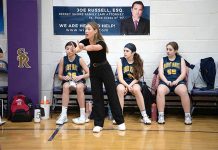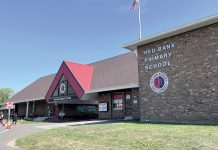By Jenna O’Donnell
LITTLE SILVER – In a large, open room filled with plush couches and long tables, a group of 35 young people ranging from 4 to 18 years old sits in a large circle to discuss the issues at their school. A baton, passed between children and teens alike, gives each person in the room a turn to speak and be heard by peers on any issue that is up for a vote.
At the Jersey Shore Free School (JSFS), the daily School Meeting is not some student advisory body, but the brains and beating heart of a school that is run by its students. Everything from the budget to the number of students and staff to the rules that everyone must follow is raised, discussed and decided by students.
No curriculum or mandatory classes exist, but Jeri Quirk, an educator, psychotherapist and mediator and one of the two full-time staff at JSFS, says students graduate and go to college confident in who they are and what they want to do.
“Life is the curriculum here,” said Quirk, who co-founded the school a decade ago. “When children are doing what they love, they learn it.”
JSFS is one of two schools in the state that follows the Sudbury model for a democratic education, where each person is treated equally regardless of age and no authority exists other than that granted by the consent of the governed. Students choose how to spend their time and are free to follow their interests and passions wherever they may lead.
For some that means building forts and bridges in the woods next to the school’s playground or constructing go-carts and racing them. Other students take computers apart, rebuild them and teach their peers to do the same. One student interested in gymnastics petitioned the school committee for money to purchase equipment. She was granted half of what she asked for and raised the rest by involving peers and parents in a bake sale. A student interested in engineering teaches math classes to his peers and will gain some hands-on experience working with an architect hired to renovate the school later this year. Any student can request a class on any topic, or offer to teach one. Current and past offerings include internet safety, algebra and a Rubik’s Cube class.
“Whether it’s Minecraft or a mechanic’s manual or a recipe, when it interests them they will learn to read the way that children learn to walk and talk,” Quirk said, adding that, with time and space, children will instinctively seek to learn what the adults in their society know.
Some of the parents of JSFS call this “sneaky learning.”
“We push nothing academically or socially and yet we end up with very bright, thoughtful young people who are compassionate and caring,” she said.
In a school where students write their own rules and direct their own learning, they also oversee their own justice. A judicial committee is made up of a rotating group that always includes one adult, one teen and one child. The students drafted a statement that is read before each hearing, setting forth their goal to “work together to find the simplest, most positive and most effective way to ensure compliance” if any rule is violated.
By practicing democracy and overseeing justice, students become naturally engaged in both the running of their school and in the world around them, said Quirk. She notes that students freely debate religion, politics and philosophy, and try to understand dissenting views. Students graduate by writing a thesis stating how they have prepared for work or college and how they plan to be a part of the adult community.
“Most adults haven’t found their passion yet,” Quirk said. “These kids live their passion every day. They know who they are and what they want.”
JSFS is a private, non-profit and nontraditional K-12 school with full-time tuition of $11,500.














